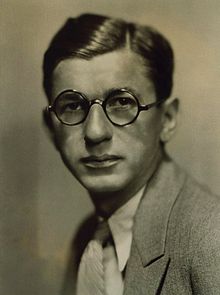Irving Caesar (born Isidor Keiser, July 4, 1895 – December 17, 1996)[2] was an American lyricist and theater composer who wrote lyrics for numerous song standards, including "Swanee", "Sometimes I'm Happy", "Crazy Rhythm", and "Tea for Two", one of the most frequently recorded tunes ever written.[3] In 1972, he was inducted into the Songwriters Hall of Fame.[4]
Irving Caesar | |
|---|---|
 Caesar in 1930 | |
| Background information | |
| Birth name | Isidor Keiser |
| Born | July 4, 1895 New York City, U.S |
| Died | December 17, 1996 (aged 101) New York City, U.S |
| Occupation | Lyricist |
| Years active | 1920s–1980s |
| Spouse |
Christina Ballesteros
(m. 1994) |
Biography
editCaesar, the son of Morris Keiser, a Romanian Jew, was born in New York City, United States.[3] His older brother Arthur Caesar was a successful Hollywood screenwriter. The Caesar brothers spent their childhood and teen years in Yorkville, the same Manhattan neighborhood where the Marx Brothers were raised. Caesar knew the Marx Brothers during his childhood. He was educated at Chappaqua Mountain Institute in Chappaqua, New York.
In his career, Caesar collaborated with a wide variety of composers and songwriters, including Rudolf Friml, George Gershwin, Sigmund Romberg, Victor Herbert, Ted Koehler and Ray Henderson.[4] Two of his best known numbers, "I Want to Be Happy" and "Tea for Two", were written with Vincent Youmans for the 1925 musical No, No, Nanette.[3] Another of his biggest hits, "Animal Crackers in My Soup", was popularized by Shirley Temple in her 1935 film Curly Top.[3] "Just a Gigolo", his 1929 adaptation of an Austrian song, was a hit for Louis Prima in the 1950s and again for David Lee Roth in the 1980s.
In the late 1930s, along with composer Gerald Marks, he wrote a famous series of children's songs focusing on safety. Caesar made hundreds of appearances in schools performing the "Sing a Song of Safety," "Sing a Song of Friendship" (a United Nations-inspired series focusing on world peace, racial tolerance and friendship) and "Songs of Health" collections.[4]
Caesar served on the songwriters' performance-rights organization ASCAP board of directors from 1930 to 1946 and again from 1949 to 1966. He was a founder of the Songwriters Guild of America.[4] He died, aged 101, in New York on December 18, 1996.[5][3]
Broadway credits
editNote: All productions are musicals unless otherwise stated.
- La La Lucille (1919) - additional lyrics
- Kissing Time (1920) - adaptation of an earlier version of this musical - co-lyricist
- Pins and Needles (1922) - revue - co-lyricist
- The Greenwich Village Follies of 1922 (1922) - revue - co-lyricist and co-bookwriter
- The Greenwich Village Follies of 1923 (1923) - revue - co-lyricist
- The Greenwich Village Follies of 1924 (1924) - revue - co-lyricist
- Betty Lee (1924) - co-lyricist
- No, No, Nanette (1925) - co-lyricist
- Charlot Revue (1925) - revue - featured lyricist for "Gigolette" and "A Cup of Coffee, a Sandwich and You"
- Yes, Yes, Yvette (1926, Chicago;[6] 1927, Broadway)[7] - lyricist[6][7]
- Sweetheart Time (1926) - co-lyricist
- Ziegfeld's Revue "No Foolin'" (1926) - revue - co-lyricist
- Betsy (1926) - co-bookwriter
- Talk About Girls (1927) - lyricist
- Here's Howe (1928) - lyricist
- Americana of 1928 (1928) - revue - co-lyricist
- Polly (1929) - co-composer and co-lyricist
- George White's Scandals of 1929 (1929) - revue - co-composer and co-lyricist
- Ripples (1930) - co-lyricist
- Nina Rosa (1930) - lyricist
- The Wonder Bar (1931) - play - co-playwright/adaptor of the original German
- George White's Scandals of 1931 (1931) - revue - co-bookwriter
- George White's Music Hall Varieties of 1932 (1932) - revue - co-composer and lyricist
- Melody (1933) - lyricist
- Shady Lady (1933) - reviser
- Continental Varieties (1934) - revue - dialogue-writer
- The White Horse Inn (1936) - English-version lyricist
- My Dear Public (1943) - co-composer, co-lyricist, and co-bookwriter
Post-retirement credits:
References
edit- ^ Smith, Liz (December 6, 1994). "(untitled news item)". Newsday. Melville, New York. p. 13.
- ^ "Lyricist of 'Swanee' Dies at 101". Ledger-Enquirer. Columbia, George. December 18, 1996. p. C5.
- ^ a b c d e Colin Larkin, ed. (1997). The Virgin Encyclopedia of Popular Music (Concise ed.). Virgin Books. p. 213. ISBN 1-85227-745-9.
- ^ a b c d "Irving Caesar Biography". Songwriters Hall of Fame. Retrieved April 1, 2018.
- ^ https://www.nytimes.com/1996/12/18/arts/irving-caesar-lyricist-of-timeless-hits-like-tea-for-two-dies-at-101.html
- ^ a b Bob Morningstar (December 18, 1926). "Chicago Premiere; Four Cohans Theatre; Yes, Yes, Yvette". Billboard.
- ^ a b "YES, YES, YVETTE' IS CHEERY, REFRESHING; Jack Whiting and Jeanette MacDonald Aid in Keeping Musical Comedy at Lively Pace". The New York Times. October 4, 1927. p. 32.